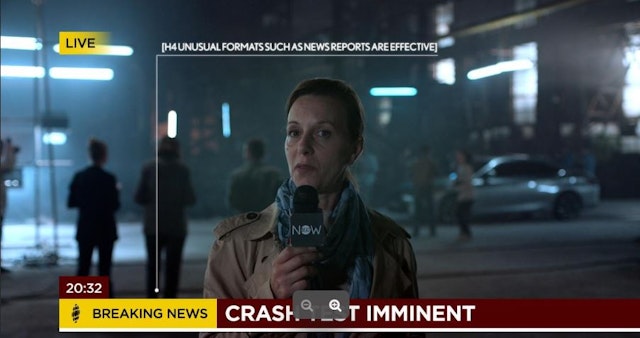Lexus reveals ad ‘created by AI’. Is it a gimmick? No. Will it win any awards? Probably not
Lexus has revealed an ad that has been entirely scripted by artificial intelligence (AI); a perplexing story of a self-aware car involved in a televised crash test.
It’s not the first time a brand has claimed to have harnessed AI to create an advert (see Mondelez and McCann for a showcase of some machine-made work) and, arguably, most of what’s gone before has erred on the side of gimmick. However, the brand’s general manager for Europe, Michael Tripp, told The Drum that this is a serious trial of how the advertiser could use AI in the creative process.
For the “experiment”, Lexus has pulled in some big hitters in the industry. It is directed by Oscar-winner Kevin Mcdonald – behind films such The Last King of Scotland – and has been made with the backing of technical partner Visual Voice, ad agency The&Partnership, and IBM Watson.
And it won’t be consigned to the Lexus YouTube channel – it will be released across cinema screens, digital, social in Europe in the coming weeks with total spend equalling that of a "traditionally" produced campaign (Lexus declined to reveal exact figures).

The process
The approach to this work “started the way it would with any other,” explained Tripp. The product at the heart of the campaign is Lexus’ new ES range of vehicles that themselves have a number of AI-based systems, like automatic braking and temperature control.
“We started with a tight brief on the product around ‘intuition’ and then went to The&Partnership. It came back with the idea of using AI,” he said.
Partnering with IBM to use its Watson technology, Lexus and the agency input a number of data points, including 15 years' of Cannes Lion award-winning ads and 10 years of the best ads in the ‘luxury’ sector, as well as employing a company called MindX to “feed” in data which related to ‘intuition’ and how people make decisions.
“I thought it would be mad or weird and we would get something back and have to move it into a great script and say it was ‘inspired’ by AI” said Dave Bedwood, creative partner, The&Partnership London.
“But what came out was a script, with a footnote in every single line that had a data point explaining why that decision was made.”
The script, for example, specified the main character cry when the car drives away, that trees should be on the left-hand side of the shot, and that any audio elements were to be accentuated.
The bulk of the AI's script was “pretty much” adhered to by the director, but it was not completely infallible. Tripp, the client, decided to change the colour of the car that had been prescribed and remove the “kissing noise” the AI had scripted when the ad’s protagonist embraced his daughter. “Honestly, that was a bit uncomfortable,” he said.

It probably won’t be winning any awards
What emerged from this process, thanks to director Mcdonald, is a beautifully shot advert which feels luxurious, but might leave some a bit perplexed.
It opens with a clear caveat that the advert was written by AI. It then jumps from a scene where the car is released by its maker. The vehicle drives along the classic ‘winding road’ scene so familiar in auto ads before the car becomes part of a televised crash test, the results of which its maker and daughter are relieved by. It ends on a final scene of the car traveling down more country roads.
The decision to have a scene show that the crash test was broadcast live by a Sky News-like channel appears to have been made because, according to the AI's notes, "unusual formats such as news reports are effective" while the shots of photographers flashbulbs are featured because "incongruous imagery increases recall".
“When I watch the ad it still makes me uncomfortable because it doesn’t quite make sense to me,” admitted Tripp, which may go some way to explaining why his metric for success on this campaign is not sales, but how many people are talking about it on social media.
With the AI having “ingested” Cannes Lion award-winning work to inspire this creative – should it be better, more award-worthy?
For Tripp, it’s a moot point. “Is this a Cannes award-winning ad? I don’t know. What I’m interested in is creating interest, desire, and action. If it wins an award I couldn’t care less. In fact, if our agencies bring up awards, I kill them. I don’t want to hear about it. It’s of zero interest to me.
“Our biggest issue in Europe is that no one knows our story. And because of that I’m more ambitious and my hope is that this will create a conversation around our vehicles, brand and prompt people to want to learn more.”
For Bedwood at The&Partnerhsip, the intention was never to create a Lion-worthy piece of work, with the creative acknowledging some people might not be impressed by it.
"We’re still at the stage where it’s interesting because a computer wrote it; you have to preface it with the story," he added. "But we’re not far from being in a situation where you might not ever know [if AI scripted the ad]"
To the likely relief of Bedwood, his fellow creatives at The&Partnership, and certainly his peers in other agencies, Lexus is not planning to replace his agency with IBM Watson any time soon.
“None of this is it designed to undermine the creative process but if we can add variables like 15 years' worth of award-winning ads or luxury ads and data into the creative process then it liberates creatives to be more subjective. I’m very optimistic that it will complement and augment the creative process and not undermine or replace. We’re fully committed to man plus machine," said Tripp.
“Maybe we should call AI the creative teammate.”

